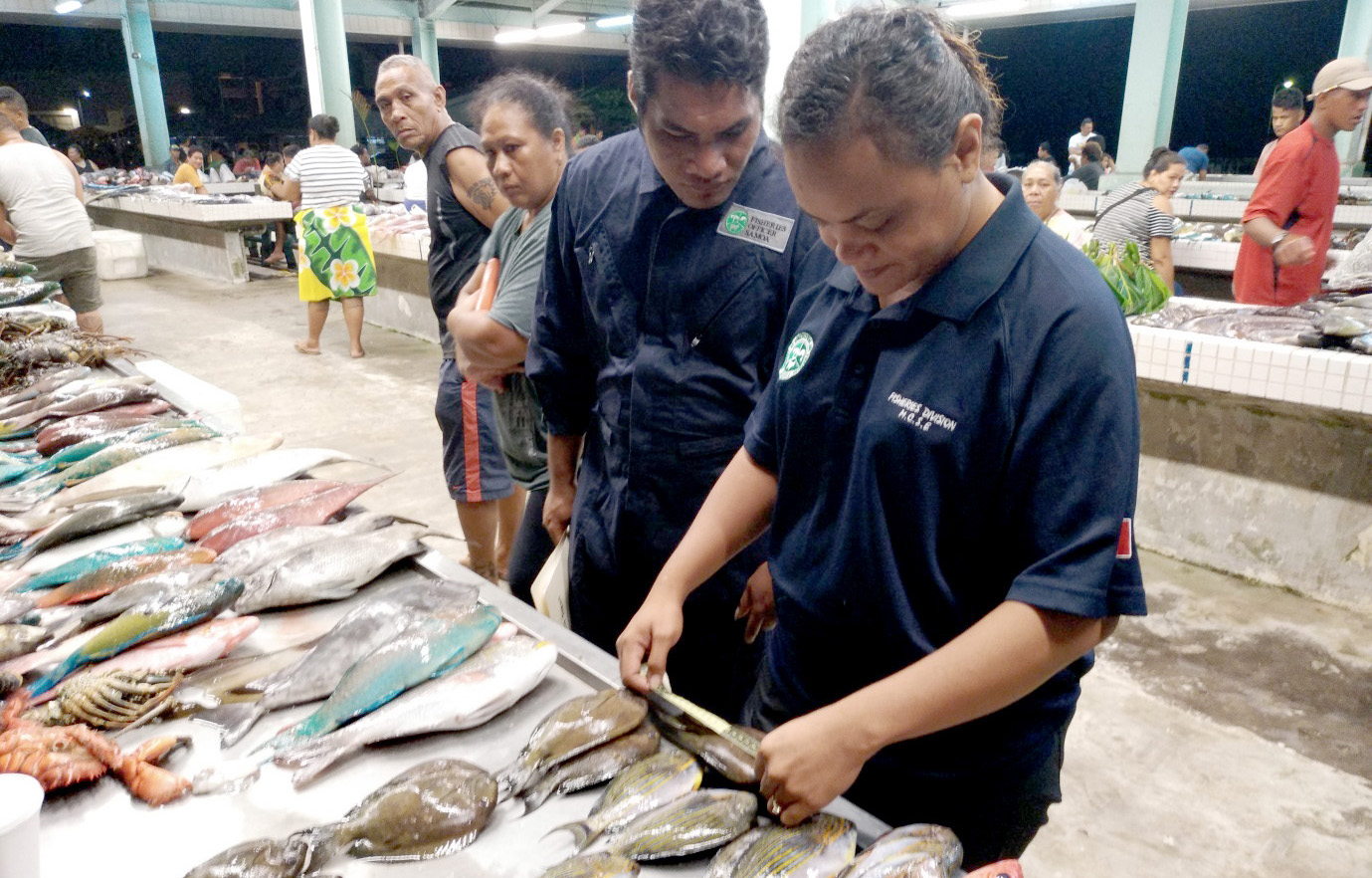Fisheries operations are about saving resources
Dozens of undersized fish and seafood were confiscated by the Ministry of Agriculture and Fisheries (M.A.F.) officials during a sting at Apia Fish Market on Sunday morning.
A team of nine fisheries officers and three Police officers spanned the market between quarter to five and eight in the morning, and identified 12 fish vendors who were carrying undersized fish, egg-carrying lobsters and crabs with soft shells – all illegal stock.
The vendors are now under investigation and their cases are being reviewed by MAF’s legal division. Depending on the offence they are found guilty of, vendors can expect a fine not exceeding T$10,000, according to the Local Fisheries Regulations 1995.
Regular weekday operations and monitoring meant fisheries officers had a fair idea of the issue at hand. They were regularly seeing illegal fish in the marketplaces, and confiscating them.
“We had identified that as one of the issues crawling back, the size of fish. So when we recognise it is an issue we start planning with the police,” said Assistant Chief Executive Officer, Magele Etuati Ropeti.
“We realised that because some of our officers do not operate on Sundays, we’d seen that was one of the days we had to look at, and it’s one of the busiest days of the market.”
While Magele said the team had observed Sunday’s having a higher prevalence of illegal fish, potentially due to a lack of fisheries officers on the job.
Senior fisheries officer, Tamaleoa Leilua, said the team was preparing their operation from early January. As a result, the large team canvassed the market and within just a few hours interviewed a dozen vendors who were breaching fisheries regulations, he said.
“Twelve possible infringements were sighted, all items were confiscated and investigations were carried out the same day,” said Senior Fisheries Officer, Yohni Fepulea’i.
“Possible charges have been laid out to suspected offenders. We are yet to complete the whole process passing over the cases files to the legal team for their review, that’s a task assigned for this week and hopefully completed by next week.”
Magele said during the operation itself, he observed several vendors being supportive and cooperative of the operation, because they are aware of the law.
“But some were reluctant to assist with the information we require,” he said.
Senior Fisheries Officer, Lui Bell, said several vendors tried to escape investigation by the officers, including a vendor who tried to take his cooler and run before being apprehended.
“Some people even came to walk in, saw there was an operation and just went back to the side to try and wait us out, but we were there the whole time,” he said.
Giving a rough estimate of the confiscated wares, Mr. Bell said approximately 50 per cent were soft shelled crabs, followed by 40 per cent of undersized fished and 10 per cent egg-carrying lobster.
“That’s a rough estimate, but they were mostly crabs,” Mr Bell said.
Magele believes the demand for crab meat is such that even when vendors know they must not catch small young, soft shelled crabs they may be under pressure to do so anyway, knowing the demand.
“They are also simple to harvest, because they are prone to being caught,” he added.
But Magele believes fishing families know what is allowed to be caught, thanks to awareness campaigns and a successful village committee engagement scheme in the coastal areas.
“I would be very surprised if people don’t know the rules,” he said.
People who fish should not trust their eyes but measure carefully fish they catch to ensure they are within regulation size, said Magele.
Fish vendors moving their wares outside the central fish market to sell on the roadside throughout town are also under the watchful eye of the fisheries division, Magele said. Operations are carried out with the partnership of police to ensure officer’s safety.
“We are so grateful to have a joint team with the Ministry of Police. It really gives us that confidence to continue with our operations,” Magele said.
The sale of small, underdeveloped or pregnant sea creatures is illegal under the Fisheries Management Act 2016, and which is broken down in the Local Fisheries Regulations of 1995. The rules are in place to allow resources to reproduce, ensuring a thriving fisheries industry and supply for Samoa.
Mr. Fepulea’i said without the enforcement of the size, egg and shell regulations, Samoa cannot guarantee the longevity of the fish supply.
“It’s about convincing [people] to voluntarily comply with the laws for the sake of the resources themselves and their children, the future of the fishing community. It’s not a matter of short term gain; we are looking long term on these regulations.”
In a “perfect world” operations like Sunday’s would be carried out every day, Magele said. Constrained by resources and several priorities, the division will continue to carry out various degrees of operations as they see fit.
Magele said he preferred not to speculate on the penalties that could be doled out to the potential offenders, or the value of the fish and seafood confiscated on Sunday. For more information or to report a fisheries-related crime, call the Fisheries Division on phone number 20369.







